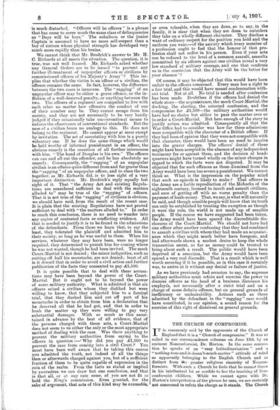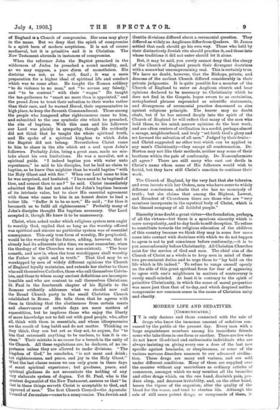THE CHURCH OF COMPROMISE.
IT is commonly said by the opponents of the Church of England that it is a "Church of compromise." It was so called in our correspondence columns on June 13th by an eminent Nonconformist, Dr. Horton. In the same connec- tion he speaks of an "easy latitudinarianism" and a " nothing-true-and-it-doesn't-much-matter " attitude of mind as apparently belonging to the English Church and as distinct from bike greater religious sincerity of Noncon- formists. With such a Church he feels that he cannot throw in his intellectual lot or confide to her the teaching of Non- conformist children. While we cannot agree with Dr. Horton's interpretation of the phrase he uses, we are certainly not concerned to refute the charge as it stands. The Church of England is a Church of compromise. Her sons may glory in the name. But we deny that the spirit of compromise is a spirit born of modern scepticism. It is not of course mediaeval, but it is primitive and it is Christian. The New Testament abounds in instances of compromise.
When the reformer John the Baptist preached in the wilderness of Judea he preached a sound morality, and, as we may suppose, a pure dorm of monotheism. His doctrine was not, as he said, final ; it was a mere preparation for a higher ideal of spiritual life and conduct which was to come after. He taught the Roman soldiery "to do violence to no man," not "to accuse any falsely," and "to be content" with their "wages." He taught the tax-gatherers to "exact no more than is appointed," and the proud Jews to trust their salvation to their works rather than their race, and he warned Herod, their representative in high place, to keep the Seventh Commandment. Those among the people who hungered after righteousness came to him, and submitted to the one symbolic rite which he preached, the rite of baptism. With this man and his followers our Lord was plainly in sympathy, though He evidently did not think that he taught the whole spiritual truth, and He spoke of a spiritual kingdom to which John the Baptist did not belong. Nevertheless Christ came to him to share in the rite which set a seal upon John's followers. Probably John, being a great .man, made no mis- take about his own limitations. He was a moralist, not a spiritual guide. "I indeed baptise you with water unto repentance," he said to his disciples, but he laid no claim to baptise, as he knew One mightier than he would baptise "with the Holy Ghost and with fire." When our Lord came to him he was surprised, and hesitated. "I have need to be baptised of thee, and comest thou to me ? " he said. Christ immediately admitted that He had not asked for John's baptism because of its intrinsic value, but to show His essential agreement with those who came to him in an honest desire to lead a better life. "Suffer it to be so now," He said ; "for thus it becometh us to fulfil all righteousness." Probably many of John's disciples thought His baptism necessary. Our Lord accepted it, though He knew it to be unnecessary.
Christ, when asked under which religious system men ought to worship God, replied that so long as the worship offered was spiritual and sincere no particular system was of essential consequence. This only true form of worship, He prophesied, would be the worship of the future, adding, however, that it already had its adherents (at a time, we must remember, when the theology of the Churches was non-existent). "The hour cometh, and now is, when the true worshippers shall worship the Father in spirit and in truth." That God may be se worshipped by men of widely different opinions the Church of England loyally maintains, and extends her shelter to those who call themselves Catholics, those who call themselves Calvin- late, and those to whom many ancient definitions are incompre- hensible and who are content to call themselves Christians. St. Paul in the fourteenth chapter of his Epistle to the Romans evidently addresses what we• should now call the Broad Church party in the small Christian Church established in Rome. He tells them that he agrees with them in thinking that the abstinences from certain meats and observances of certain days are mere matters of superstition, but he implores those who enjoy the liberty of more knowledge not to fall out with good people, who, after all, think with them in essentials, and whose idiosyncrasies are the result of long habit and do not matter. Thinking as they think, they can but act as they act, he argues, for "to him that esteemeth anything to be unclean, to him it is un- clean." Their mistake is no cause for a breach in the unity of the Church. All these regulations are, he declares, of no im- portance unless they are allowed to make divisions. "The kingdom of God," he concludes, "is not meat and drink; but righteousness, and peace, and joy in the Holy Ghost." What the last clause means we can only guess in these days Of scant spiritual experience ; but goodness, peace, and spiritual gladness do not necessitate the holding of any very elaborate system of dogma. Yet St. Paul, who is the greatest dogmatist of the New Testament, assures us that " he that in these things serveth Christ is acceptable to God, and approved of men." The first Church Council—the Apostolic Council of Jerusalem—came to a compromise. The Jewish and
Gentile divisions differed about a ceremonial question. They differed as widely as Anglicans differ from Quakers. St. James settled that each should go his own way. Those who held by their distinctively Jewish rite should practise it, and those into whose traditions it did not enter should let it alone.
But, it may be said, you surely cannot deny that the clergy of the Church of England preach their divergent doctrines with a somewhat uncompromising zeal. This is certainly true. We have no doubt, however, that the Bishops, priests, and deacons of the earliest Church differed considerably in their private judgments. It is quite possible for a member of the Church of England to enter an Anglican church and hear opinions declared to be necessary to. Christianity which he does not find in the Gospels, hopes sworn to as certainties, metaphorical phrases expounded as scientific statements, and divergences of ceremonial practice denounced as sins against religious • principle. The hearer may no doubt chafe, but if he has entered deeply into the spirit of the Church of England he will reflect that many of the men who hold these, to his mind, narrow opinions do the best work, and are often centres of civilisation in a sordid, perhaps almost a savage, neighbourhood, and truly "set forth God's glory and set forward the salvation of all men." Judged by their fruits— and Christ suggested no other test which can be applied to any man's Christianity—they escape all condemnation. Dr. Horton may not like their methods, neither may some of their brethren within the pale of conformity. Do Nonconformists all agree ? There are still many who cast out devils in Christ's name whom some of His followers would wish to forbid, but they have still Christ's sanction to continue their work.
The Church of England, by the very fact that she tolerates, and even invests with her Orders, meu who have come to widely different conclusions, admits that she has no monopoly of truth ; but she claims that among the Highest, Lowest, and Broadest of Churchmen there are those who are "very members incorporate in the mystical body of Christ, which is the blessed company of all faithful people."
Sincerity is no doubt a great virtue—the foundation, perhaps, of all the virtues—but there is a spurious sincerity which is mere scrupulosity, and to-day leads to self-deception. To refuse to contribute towards the religious education of the children of this country because we think they may in some few cases come into contact with doctrines with which we do not happen to agree is not to put conscience before conformity,—it is to put nonconformity before Christianity. All Christian Churches exist for the service of God and man. The chief aim of the Church of Christ as a whole is to keep men in mind of these two pre-eminent duties and to urge them to "lay hold on the life which is life indeed." To refuse to range oneself openly on the side of this great spiritual force for fear of appearing to agree with one's neighbours in matters of controversy is surely small-minded. At least it is contrary to the spirit of primitive Christianity, in which the sense of moral proportion was more just than that of to-day, and which despised neithes compromise nor common-sense in the cause of Christian unity and charity.











































 Previous page
Previous page